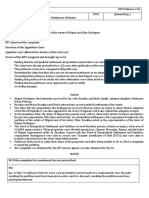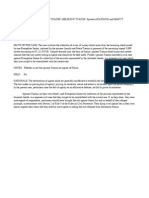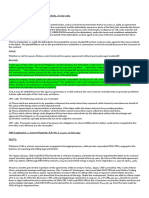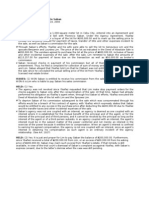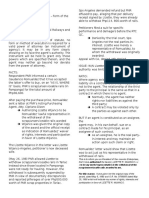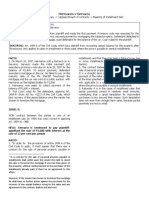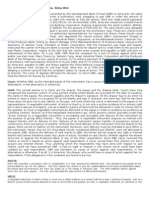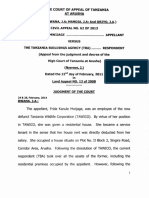Article 1810-1814, Partnership (DIGEST)
Article 1810-1814, Partnership (DIGEST)
Uploaded by
Stephen CabalteraCopyright:
Available Formats
Article 1810-1814, Partnership (DIGEST)
Article 1810-1814, Partnership (DIGEST)
Uploaded by
Stephen CabalteraOriginal Description:
Copyright
Available Formats
Share this document
Did you find this document useful?
Is this content inappropriate?
Copyright:
Available Formats
Article 1810-1814, Partnership (DIGEST)
Article 1810-1814, Partnership (DIGEST)
Uploaded by
Stephen CabalteraCopyright:
Available Formats
Clemente vs.
Galvan
Facts:
Plaintiff and defendant organized a civil
partnership which they named "Galvan y
Compaia" to engage in the manufacture
and sale of paper and other stationery.
Plaintiff ask for dissolution which the
defendant confirm but with a condition
that having covered a deficit incurred by
the partnership amounting to P4,000 with
his own money, plaintiff reimburse him of
one-half of said sum.
Juan D. Mencarini, assigned as receiver
and liquidator. Upon acting on his duty,
the court ordered him to deliver certain
machines which were then at Nos. 705-
707 Ylaya Street.
But before he could take actual
possession of said machines, upon the
strong opposition of defendant, the court,
on motion of the latter, suspended the
effects of its order
In the meantime the judgments rendered
in cases Nos. 42794 and 43070 ordering
Clemente to pay a sum of money.
He mortgage the machines with his
nephew, the intervenor (plaintiff in the
herein case.) For having expired the
terms in the mortgage the intervenor
commenced case No. 49629 to collect his
mortgage credit.
Issue: W/N the mortgage between Clemente and
his nephew (intervenor, plaintiff in the case) is
valid?
Rule: No. The machines in contention originally
belonged to the defendant and from him were
transferred to the partnership Galvan y Compania.
This being the case, said machines belong to the
partnership and not to him, and shall belong to it
until partition is effected according to the result
thereof after the liquidation. Also, Clemente did
not have actual possession of the machines, he
could not in any manner mortgage them.
Leyte-Samar-Sales and K. Tomassi vs. Cea and
O. Castrilla
Facts:
Thisis a suit for damages by the Leyte-
Samar Sales Co. (hereinafter called
LESSCO) and Raymond Tomassi against
the Far Eastern Lumber & Commercial Co.
(unregistered commercial partnership
hereinafter called FELCO), Arnold Hall,
Fred Brown and Jean Roxas, judgment
against defendants jointly and severally
for the amount of P31,589.14 plus costs.
The decision having become final, the
sheriff sold at auction on June 9, 1951 to
Robert Dorfe and Pepito Asturias "all the
rights, interests, titles and participation"
of the defendants in certain buildings and
properties described in the certificate
on June 4, 1951 Olegario Lastrilla filed in
the case a motion, wherein he claimed to
be the owner by purchase on September
29, 1949, of all the "shares and interests"
of defendant Fred Brown
June 13, 1951, granted Lastrilla's motion.
On August 14, 1951, modified its order of
delivery and merely declared that
Lastrilla was entitled to 17 per cent of the
properties sold.
the petitioners seek relief by certiorari,
their position being the such orders were
null and void for lack of jurisdiction.
Issue: W/N the court acted with excess of its
jurisdiction?
Rule: Yes. The parties were not notified, and
obviously took no part in the proceedings on the
motion. A valid judgment cannot be rendered
where there is a want of necessary parties, and a
court cannot properly adjudicate matters involved
in a suit when necessary and indispensable parties
to the proceedings are not before it. (49 C.J.S., 67.).
All the defendants would have reasonable motives
to object to the delivery of 17 per cent of the
proceeds to Lustrial, because it is so much money
deducted, and for which the plaintiffs might as
another levy on their other holdings or resources.
(NOTE: If Lastrilla was a partner, his remedy is
to claim "the property", not the proceeds of the
sale, which the sheriff is directed by section 14,
Rule 39 to deliver unto the judgment creditors.
In other words, the owner of property
wrongfully sold may not voluntarily come to
court, and insist, "I approve the sale, therefore
give me the proceeds because I am the owner".
The reason is that the sale was made for the
judgment creditor (who paid for the fees and
notices), and not for anybody else.)
Us v. Clarin
Facts:
Pedro Larin delivered to Pedro Tarug
P172, in order that the latter, in company
with Eusebio Clarin and Carlos de
Guzman, might buy and sell mangoes. The
profits were to be divided equally
between him and them.
Pedro Tarug, Eusebio Clarin, and Carlos
de Guzman did in fact trade in mangoes
and obtained P203 from the business, but
did not comply with the terms of the
contract by delivering to Larin his half of
the profits; neither did they render him
any account of the capital.
Larin charged them with the crime
of estafa, but the provincial fiscal filed an
information only against Eusebio Clarin
First Instance of Pampanga, sentenced the
defendant, Eusebio Clarin, to six
months'arresto mayor. The defendant
appealed.
Issue: W/N the conviction is correct.
Rule: No. The P172.00 having been received by
the partnership, the business commenced and
profits accrued, the action that lies with the
partner who furnished the capital for the recovery
of his money is not a criminal action for estafa, but
a civil one arising from the partnership contract
for a liquidation of the partnership and a levy on
its assets if there should be any.
(NOTE: The then Penal Code provides that
those who are guilty of estafa are those who,
to the prejudice of another, shall appropriate
or misapply any money, goods, or any kind of
personal property which they may have
received as a deposit on commission for
administration or in any other producing the
obligation to deliver or return the same, (as,
for example, in commodatum, precarium, and
other unilateral contracts which require the
return of the same thing received) does not
include money received for a partnership;
otherwise the result would be that, if the
partnership, instead of obtaining profits,
suffered losses, as it could not be held liable
civilly for the share of the capitalist partner
who reserved the ownership of the money
brought in by him, it would have to answer to
the charge of estafa, for which it would be
sufficient to argue that the partnership had
received the money under obligation to return
it.)
You might also like
- The Child Whisperer - The Ultima - Carol TuttleDocument430 pagesThe Child Whisperer - The Ultima - Carol Tuttlesaleanddeki100% (5)
- G.R. No. L-5953 February 24, 1912 ANTONIO M. PABALAN, Plaintiff-Appellant, vs. FELICIANO VELEZ, DefendantDocument3 pagesG.R. No. L-5953 February 24, 1912 ANTONIO M. PABALAN, Plaintiff-Appellant, vs. FELICIANO VELEZ, DefendantMaceda KadatuanNo ratings yet
- 3rd Mock Exam-Answer Key PDFDocument1 page3rd Mock Exam-Answer Key PDFStephen CabalteraNo ratings yet
- Legal Research and WritingDocument5 pagesLegal Research and WritingAD100% (7)
- Related Cases PartnershipDocument6 pagesRelated Cases PartnershipVOJNo ratings yet
- Litonjua Vs Litonjua Facts:: Quo Is Void or Legally Inexistent)Document2 pagesLitonjua Vs Litonjua Facts:: Quo Is Void or Legally Inexistent)Ghreighz GalinatoNo ratings yet
- NYCO SALES CORPORATION V BA FINANCE CORPORATIONDocument2 pagesNYCO SALES CORPORATION V BA FINANCE CORPORATIONColee StiflerNo ratings yet
- Case No.50 Bearneza Vs DequillaDocument1 pageCase No.50 Bearneza Vs Dequillapaul2574No ratings yet
- Doles Vs AngelesDocument2 pagesDoles Vs AngelesAlnessa MheaNo ratings yet
- Oscar Angeles vs. Secretary of JusticeDocument2 pagesOscar Angeles vs. Secretary of JusticeValora France Miral AranasNo ratings yet
- Lozana V DepakakiboDocument2 pagesLozana V DepakakibomihhNo ratings yet
- 015 Pedrosa V CADocument2 pages015 Pedrosa V CADarrell MagsambolNo ratings yet
- Victorias Milling Vs CA Consolidated Sugar Corp G R No 117356 June 19 2000 DIGESTEDDocument2 pagesVictorias Milling Vs CA Consolidated Sugar Corp G R No 117356 June 19 2000 DIGESTEDdemsanpedroNo ratings yet
- Bordador v. LuzDocument2 pagesBordador v. LuzdelayinggratificationNo ratings yet
- Rural Bank of Bombon v. Court of AppealsDocument2 pagesRural Bank of Bombon v. Court of AppealsJDR JDRNo ratings yet
- Leyte Samar Sales CoDocument2 pagesLeyte Samar Sales CoBion Henrik PrioloNo ratings yet
- Consolidated Agency Case DigestDocument41 pagesConsolidated Agency Case DigestArchie AgustinNo ratings yet
- Clemente Vs GalvanDocument1 pageClemente Vs GalvanSarah CadioganNo ratings yet
- Agency DigestDocument3 pagesAgency DigestVictor LimNo ratings yet
- Diolosa v. CADocument1 pageDiolosa v. CAd2015memberNo ratings yet
- 02 Barton Vs LeyteDocument2 pages02 Barton Vs LeyteJaymee Andomang Os-agNo ratings yet
- Lipata V TutaanDocument2 pagesLipata V TutaanAngelo Tiglao100% (1)
- Jo Chung Cang Vs Pacific Commercial Co., 45 Phil. 142Document3 pagesJo Chung Cang Vs Pacific Commercial Co., 45 Phil. 142Vanessa Yvonne GurtizaNo ratings yet
- 16 Jo Chung Cang Vs Pacific Commercial CompanyDocument2 pages16 Jo Chung Cang Vs Pacific Commercial CompanyJudy Ann ShengNo ratings yet
- Ronquillo DigestDocument3 pagesRonquillo DigestMama MiaNo ratings yet
- HEIRS OF TAN ENG KEE Vs CADocument2 pagesHEIRS OF TAN ENG KEE Vs CAJelaine AñidesNo ratings yet
- San Miguel Properties Philippines v. HuangDocument1 pageSan Miguel Properties Philippines v. HuangMorales GenecioNo ratings yet
- Agency - Extinguishment of Agency Case DigestDocument9 pagesAgency - Extinguishment of Agency Case DigestAure ReidNo ratings yet
- Munasque V CA (Scra Digest)Document4 pagesMunasque V CA (Scra Digest)Hanzel Uy VillonesNo ratings yet
- Liwanag Vs CADocument1 pageLiwanag Vs CAEduard RiparipNo ratings yet
- PNB vs. Lo Et Al G.R. No. L-26937, October 5, 1927 DigestedDocument1 pagePNB vs. Lo Et Al G.R. No. L-26937, October 5, 1927 DigestedJacquelyn AlegriaNo ratings yet
- Obligations of The Agent SCRADocument8 pagesObligations of The Agent SCRAJohn Ceasar Ucol ÜNo ratings yet
- Patrimonio vs. GutierrezDocument2 pagesPatrimonio vs. GutierrezButch Sui GenerisNo ratings yet
- Digest of Lim v. Saban (G.R. No. 163720)Document1 pageDigest of Lim v. Saban (G.R. No. 163720)Rafael PangilinanNo ratings yet
- Atp 2016 2017 Digest CasesDocument114 pagesAtp 2016 2017 Digest Casesbabyclaire17No ratings yet
- Goquiolay vs. Sycip Case DigestDocument4 pagesGoquiolay vs. Sycip Case DigestDiannee Romano100% (1)
- Munasque vs. CADocument2 pagesMunasque vs. CAKelsey Olivar MendozaNo ratings yet
- 34 - CMS Logging, Inc. vs. CADocument2 pages34 - CMS Logging, Inc. vs. CAMargarita Pesons RafolsNo ratings yet
- G.R. No. L-5963 - The Leyte-Samar Sales Co. vs. Sulpicio V. Cea FactsDocument2 pagesG.R. No. L-5963 - The Leyte-Samar Sales Co. vs. Sulpicio V. Cea FactsChristine MontefalconNo ratings yet
- Eurotech Industrial Technologies vs. CuizonDocument2 pagesEurotech Industrial Technologies vs. CuizonEmille ViolaNo ratings yet
- Partnership Case DigestDocument2 pagesPartnership Case DigestHafsah Dmc'go100% (1)
- BusOrg Digest TORRES Vs CADocument2 pagesBusOrg Digest TORRES Vs CAAna Adolfo75% (4)
- DigestDocument3 pagesDigestKrisha FayeNo ratings yet
- Torts10 - Venerando C Olandria vs. Eugenio E Fuentes Jr.Document3 pagesTorts10 - Venerando C Olandria vs. Eugenio E Fuentes Jr.Dion Ceazar PascuaNo ratings yet
- Angeles V PNRDocument2 pagesAngeles V PNRJenny Mary DagunNo ratings yet
- 24 Martinez V Ong Pong CoDocument1 page24 Martinez V Ong Pong CoRaven Claire MalacaNo ratings yet
- 06) Republic v. EvangelistaDocument1 page06) Republic v. EvangelistaChaNo ratings yet
- Inchausti Vs CromwellDocument4 pagesInchausti Vs CromwelljessapuerinNo ratings yet
- Pascual vs. Cir 166 Scra 560Document5 pagesPascual vs. Cir 166 Scra 560FranzMordenoNo ratings yet
- Spec Pro CasesDocument19 pagesSpec Pro Casespaul2574No ratings yet
- La Fuerza V CADocument2 pagesLa Fuerza V CAbee tifulNo ratings yet
- DIGEST - Mate v. CA PDFDocument2 pagesDIGEST - Mate v. CA PDFLuis MacababbadNo ratings yet
- Lozana Vs Depakakibo DigestDocument1 pageLozana Vs Depakakibo Digestmorningmindset100% (1)
- Disallowance of Wills - Ramagosa V RamagosaDocument1 pageDisallowance of Wills - Ramagosa V RamagosaJei Essa AlmiasNo ratings yet
- Eugenia Lichauco Et Al., Plaintiffs and Appellants, vs. Faustino Lichauco, Defendant and AppellantDocument3 pagesEugenia Lichauco Et Al., Plaintiffs and Appellants, vs. Faustino Lichauco, Defendant and AppellantLorjyll Shyne Luberanes TomarongNo ratings yet
- Sardane Vs Ca DigestDocument1 pageSardane Vs Ca DigestIvy Paz100% (1)
- Liwanag v. CA (Partnership)Document1 pageLiwanag v. CA (Partnership)Cheeno PelayoNo ratings yet
- New Manila Lumber v. Republic of The PhilippinesDocument1 pageNew Manila Lumber v. Republic of The PhilippinesAbegail GaledoNo ratings yet
- J. Tiosejo Investment V Spouses Ang, GR No. 174149, Sep. 8, 2010 (Partnership)Document3 pagesJ. Tiosejo Investment V Spouses Ang, GR No. 174149, Sep. 8, 2010 (Partnership)Virgil Kit Augustin AbanillaNo ratings yet
- Soce2023bskeforms Form1Document1 pageSoce2023bskeforms Form1rodacwangq100% (1)
- Article 1810 1814 Partnership DIGESTDocument2 pagesArticle 1810 1814 Partnership DIGESTAya MrvllaNo ratings yet
- Partnership Cases DigestedDocument6 pagesPartnership Cases DigestedgretchengeraldeNo ratings yet
- Republic of The PhilippinesDocument3 pagesRepublic of The PhilippinesSuho Leexokleader KimNo ratings yet
- Comment For Supplemental Guidelines On DILG MC 2010-13 v.2Document2 pagesComment For Supplemental Guidelines On DILG MC 2010-13 v.2Stephen CabalteraNo ratings yet
- Legal-Related DocumentsDocument15 pagesLegal-Related DocumentsStephen CabalteraNo ratings yet
- Title of Project: I. BackgroundDocument2 pagesTitle of Project: I. BackgroundStephen CabalteraNo ratings yet
- Building Traction For Start-Ups - ProposalDocument2 pagesBuilding Traction For Start-Ups - ProposalStephen CabalteraNo ratings yet
- Bar-Commercial-Law-2016 & 2017Document24 pagesBar-Commercial-Law-2016 & 2017Stephen CabalteraNo ratings yet
- PNB vs. CADocument8 pagesPNB vs. CAStephen CabalteraNo ratings yet
- EB Villarosa v. Judge BenitoDocument6 pagesEB Villarosa v. Judge BenitoStephen CabalteraNo ratings yet
- Strict Construction: Appeals (G.R. No. 111305) Involving The Same Factual Milieu in PNB'SDocument29 pagesStrict Construction: Appeals (G.R. No. 111305) Involving The Same Factual Milieu in PNB'SStephen CabalteraNo ratings yet
- Camarines Sur vs. E. AquinoDocument5 pagesCamarines Sur vs. E. AquinoStephen CabalteraNo ratings yet
- Maute vs. Ortega (: Case Cannot Be FoundDocument1 pageMaute vs. Ortega (: Case Cannot Be FoundStephen CabalteraNo ratings yet
- PRC Form No 104 KyleDocument1 pagePRC Form No 104 KyleStephen CabalteraNo ratings yet
- Taligaman RequestDocument51 pagesTaligaman RequestStephen CabalteraNo ratings yet
- Estate and Donors Tax Dela CalzadaDocument12 pagesEstate and Donors Tax Dela CalzadaStephen CabalteraNo ratings yet
- Republic of The Philippines: Factual AntecedentsDocument6 pagesRepublic of The Philippines: Factual AntecedentsStephen CabalteraNo ratings yet
- Vat NotesDocument11 pagesVat NotesStephen CabalteraNo ratings yet
- Tariff Ingles NewDocument30 pagesTariff Ingles NewStephen CabalteraNo ratings yet
- Be Submitted To The Taxpayer Service Programs and Monitoring DivisionDocument1 pageBe Submitted To The Taxpayer Service Programs and Monitoring DivisionStephen CabalteraNo ratings yet
- Valerie Jane A. Villanueva: 027 MV Tupaz Street Butuan City Contact No .+639306383272Document2 pagesValerie Jane A. Villanueva: 027 MV Tupaz Street Butuan City Contact No .+639306383272Stephen CabalteraNo ratings yet
- Compilation of Digested Cases in SuccessionDocument92 pagesCompilation of Digested Cases in SuccessionAnalynE.Ejercito-BeckNo ratings yet
- Law Ombudsman EssayDocument2 pagesLaw Ombudsman EssayRenaeNo ratings yet
- Gravador v. Mamigo G.R. No. L-24989Document3 pagesGravador v. Mamigo G.R. No. L-24989Jopan SJNo ratings yet
- Criminology Project PDFDocument12 pagesCriminology Project PDFMohammad Ziya AnsariNo ratings yet
- Affidavit of Self AdjudicationDocument1 pageAffidavit of Self AdjudicationPatrio Jr SeñeresNo ratings yet
- Senator Cynthia VillarDocument2 pagesSenator Cynthia VillarLaxmie Maun CarlosNo ratings yet
- 8 Pineda Vs de JesusDocument2 pages8 Pineda Vs de JesusDianne Camille UyNo ratings yet
- Affidavit of Two Disinterested. Libatin and LuibDocument2 pagesAffidavit of Two Disinterested. Libatin and LuibDave Gerard CortesNo ratings yet
- Aznar Brothers Realty Com. v. Aying G.R. NO. 144773, 16 May 2006Document6 pagesAznar Brothers Realty Com. v. Aying G.R. NO. 144773, 16 May 2006alilramonesNo ratings yet
- Magdalena T Arciga Vs Segundino D ManiwangDocument2 pagesMagdalena T Arciga Vs Segundino D ManiwangCaryle Gosiaoco100% (1)
- Ethics CoverageDocument10 pagesEthics CoverageNATHANIEL GUIANANNo ratings yet
- Civrev2 Samplex EditedDocument3 pagesCivrev2 Samplex EditedMa Jel Kristine Yumang-PalmaNo ratings yet
- Certficate of AppreciationDocument5 pagesCertficate of AppreciationSusan LorsanoNo ratings yet
- Eagle Ridge Golf Country Club V CA EREUDocument3 pagesEagle Ridge Golf Country Club V CA EREUVianca MiguelNo ratings yet
- 8th DHLG Report On Implementation of UNCRPDDocument336 pages8th DHLG Report On Implementation of UNCRPDgiorgitsNo ratings yet
- United States v. James L. Williams, 837 F.2d 1009, 11th Cir. (1988)Document11 pagesUnited States v. James L. Williams, 837 F.2d 1009, 11th Cir. (1988)Scribd Government DocsNo ratings yet
- Development Bank of Rizal Vs SIMA WEIDocument2 pagesDevelopment Bank of Rizal Vs SIMA WEIhash_tntNo ratings yet
- CNG Financial Corporation v. Google Inc - Document No. 65Document3 pagesCNG Financial Corporation v. Google Inc - Document No. 65Justia.comNo ratings yet
- Appeals: Stages of AppealDocument4 pagesAppeals: Stages of AppealMaham WasimNo ratings yet
- LANDMARK Tax Judgement in FAVOUR of Indian Seafarers Dec 2016Document6 pagesLANDMARK Tax Judgement in FAVOUR of Indian Seafarers Dec 2016सचिनरावतNo ratings yet
- 17 Ways To Express Interest in Matrimony Sites To Get A ResponseDocument11 pages17 Ways To Express Interest in Matrimony Sites To Get A ResponseBalajiKothandan100% (1)
- Daniel - Bensing@usdoj - Gov: Defendants' Motion To Exceed Page LimitationsDocument4 pagesDaniel - Bensing@usdoj - Gov: Defendants' Motion To Exceed Page Limitationsseanadam410No ratings yet
- .Implementation of Teenage Pregnancy Prevention Program in Rizal Medical CenterDocument6 pages.Implementation of Teenage Pregnancy Prevention Program in Rizal Medical CenterRolando E. CaserNo ratings yet
- Frida Kanule Mwijage... Appellant VS The Tanzania Buildings Agency... Respondent Civil Appeal No.62 of 2013 Judgement Hon - Bwana, J.ADocument4 pagesFrida Kanule Mwijage... Appellant VS The Tanzania Buildings Agency... Respondent Civil Appeal No.62 of 2013 Judgement Hon - Bwana, J.ADATIUS DIDACE(Amicus Curiae)⚖️No ratings yet
- Employment of MinorsDocument56 pagesEmployment of MinorsHarold B. Lacaba100% (6)
- Initial Brief For Appeal - BODWELLDocument16 pagesInitial Brief For Appeal - BODWELLDarrenJohnes100% (2)
- Actionable Documents (Case)Document14 pagesActionable Documents (Case)Katherine OlidanNo ratings yet
- Goesaert V ClearyDocument6 pagesGoesaert V ClearyIvy BernardoNo ratings yet











